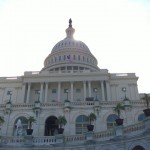Voting these days is an act of faith. We take the time to go to a polling station and cast a ballot even though we know our vote won’t affect the outcome of the election. And even if it did, our political system is so broken that fundamental change often seems unlikely anyway.
We Americans have, after all, become profoundly cynical about our institutions. About 22% of us trust the financial system while 76% say the nation’s economic structure “favors a very small proportion of the rich over the rest of the country.” Confidence in the institution of the presidency hovers in the mid-30s and trust in Congress has fallen to a staggering 11% — lower than the proportion of Americans who trusted in King George during the Revolutionary War.
Unfortunately, this lack of confidence is probably justified. Journalist Chris Hayes has dubbed the last 10 years “the Fail Decade” because of just how badly the elites running American institutions have bungled their responses to crises ranging from Hurricane Katrina to the Iraq war to the meltdown on Wall Street to pedophilia in the Catholic Church to steroids in Major League Baseball. Meanwhile, the richest Americans are able to wield such outsized influence on our electoral process that ordinary citizens might be forgiven for thinking they’ve been practically reduced to spectators in a so-called democracy.
Those who hoped for change in the Obama era did get some, but not much. Health care reform, yes — but in a way that solidified insurance and drug companies’ control. Financial reform, sort of — without truly curtailing Wall Street power or even prosecuting the fraudsters who’d caused the financial crisis. Small steps were taken on nuclear proliferation, one of humanity’s two great existential threats, but nothing happened on climate change, the other one. Proposals to buttress union strength died and the United States remained the incarceration capital of the world. The Bush administration’s civil liberties abuses such as indefinite detention, warrantless wiretaps, immunity for torturers, executive secrecy, and conception of the world as a battlefield in which the Commander-in-Chief is bound by no law remained alive and well. Indeed, the Obama administration has surpassed Bush’s lawlessness on several counts, like maintaining the right to assassinate American citizens without due process, prosecuting more whistleblowers than any president in history, defining support for terrorism so broadly that run-of-the-mill social activism could be a criminal offense, and going to war despite failing to obtain authorization from Congress.
All of this non-change happened despite a historical moment that seemed tailor-made for transformation. There was a change election in 2008, a once-in-a-generation economic crisis, and, for a spell, single-party control over the White House and Congress. If progress is going to be so modest under even those circumstances, what hope do we have for something more substantial? Why bother voting instead of spending that half-hour catching up on sleep?
Which brings us to faith. The book of Hebrews famously defines faith as “the assurance of things hoped for, the conviction of things not seen.” This notion of faith may seem naïve to the scientifically minded and quaint to the more cynical angels of our nature. It may seem inadequate to hardened realists who say that, sure, change may be possible, but only if we act rationally, with clear eyes, rather than allow ourselves to fall victim to wishful thinking. There’s something to be said for all of that. Surely we shouldn’t just accept that whatever we want will magically materialize without sound strategy, hard work, and luck.
Yet the Clear Eyes mindset is missing something too: the I Believe spirit. This is the spirit that makes us dream and not just desire. It’s what nurtures the side of ourselves that sees possibility instead of limitation; inspires us to say yes instead of maybe; and dares us to risk vulnerability and let our hearts get full. We have to believe in seemingly unbelievable things if we want to achieve what’s seemingly unachievable. Faith is not a strategy; it’s a posture.
Voting, then, may make little rational sense. With any given voter, it has no impact. And with any given election, the world may feel only a marginal difference. But voting is one little way that we can say to ourselves, “I believe.” It’s an expression of faith in the possibility of change — a faith that could itself engender that possibility. And that’s quite something.
I’m going to vote when elections come around in a few weeks. Yes, the ballot I cast will be for flawed candidates in a flawed system, and I’m likely to spend the ensuing years frustrated at how little is getting done. I’ll also know that, strategically speaking, voting is just one avenue for citizens to turn the world as it is into the world as it should be, with advocacy and direct services and organizing serving as crucial forms of activism. Yet this vote will be a reminder to myself to stay focused on the horizon — on the change that our nation and world desperately need — knowing it’s an awful long way away but believing it’s worth the walk.











